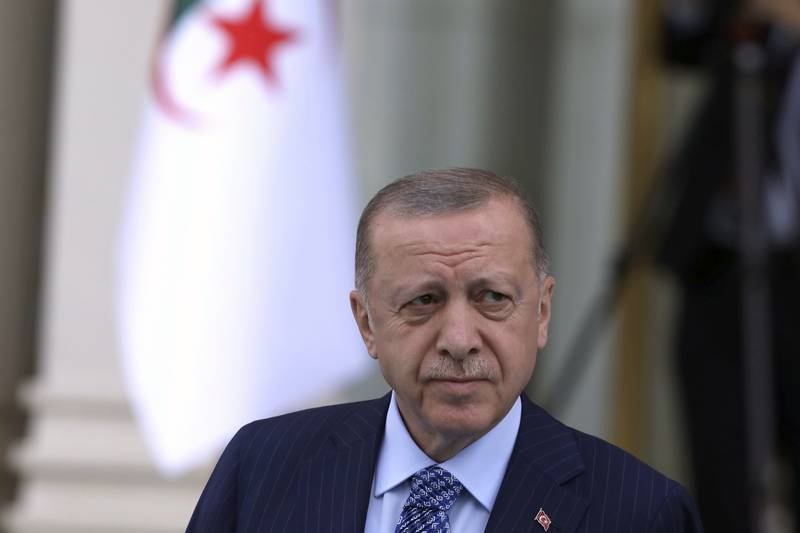Turkey's Erdogan 'cannot say yes' to Nato bid from Sweden and Finland

Turkey's President Recep Tayyip Erdogan has said he "cannot say yes" to bids by Sweden and Finland to join Nato because of their perceived inaction against exiled Kurdish militants. Sweden joined Finland in announcing it would seek Nato membership on Monday, after Russian’s invasion of Ukraine, ending more than 200 years of military non-alignment.
Last week, Mr Erdogan said the Nordic countries' path to Nato would not be easy. All 30 Nato countries must agree to allowing new members.
Speaking to reporters on Monday, he accused the Finland and Sweden of refusing to extradite “terrorists” wanted by Turkey. “Neither country has an open, clear stance against terrorist organisations,” Mr Erdogan said, in an apparent reference to Kurdish militant groups, such as the banned Kurdistan Workers´ Party (PKK).
Swedish officials said they would send a team of diplomats to Ankara to discuss the matter, but Mr Erdogan suggested they were wasting their time. “Are they coming to try to convince us? Sorry, don't wear yourselves out,” he said. “During this process, we cannot say ‘yes’ to those who impose sanctions on Turkey, on joining Nato, which is a security organisation.”
Sweden has welcomed hundreds of thousands of refugees from the Middle East in recent decades, including ethnic Kurds from Syria, Iraq and Turkey. Turkey's objections took many Western officials by surprise, with some having believed that Ankara would not let the issue affect the Nato expansion, AP reported. Nato Secretary General Jens Stoltenberg at the weekend said: “Turkey has made it clear that their intention is not to block membership.”
In Washington, Swedish ambassador Karin Olofsdotter was among those who said they were taken aback by Mr Erdogan's objections. “We have a very strong anti-terrorist agenda and a lot of, almost, accusations that are coming out are simply not true,” she said.
Sweden decided on Monday to seek Nato membership, a day after the country’s governing Social Democratic Party endorsed a plan for the country to join the transatlantic alliance and Finland’s government announced that it would seek membership, too.
Sweden in 'vulnerable position' over Russia
Swedish Prime Minister Magdalena Andersson said the country would be in a “vulnerable position” during the application process and urged her fellow citizens to brace themselves for the Russian response.
“Russia has said that it will take countermeasures if we join Nato,” she said. “We cannot rule out that Sweden will be exposed to, for instance, disinformation and attempts to intimidate and divide us.”
Moscow has repeatedly warned Finland, which has a 1,340-kilometer border with Russia, and Sweden of repercussions should they pursue Nato membership.
Russian President Vladimir Putin on Monday seemed to play down the significance of their move. Speaking to a Russian-led military alliance of six ex-Soviet states, Mr Putin said Moscow “does not have a problem” with Sweden or Finland applying for Nato membership, but that “the expansion of military infrastructure on to this territory will, of course, give rise to our reaction in response".
Last week, Mr Erdogan said the Nordic countries' path to Nato would not be easy. All 30 Nato countries must agree to allowing new members.
Speaking to reporters on Monday, he accused the Finland and Sweden of refusing to extradite “terrorists” wanted by Turkey. “Neither country has an open, clear stance against terrorist organisations,” Mr Erdogan said, in an apparent reference to Kurdish militant groups, such as the banned Kurdistan Workers´ Party (PKK).
Swedish officials said they would send a team of diplomats to Ankara to discuss the matter, but Mr Erdogan suggested they were wasting their time. “Are they coming to try to convince us? Sorry, don't wear yourselves out,” he said. “During this process, we cannot say ‘yes’ to those who impose sanctions on Turkey, on joining Nato, which is a security organisation.”
Sweden has welcomed hundreds of thousands of refugees from the Middle East in recent decades, including ethnic Kurds from Syria, Iraq and Turkey. Turkey's objections took many Western officials by surprise, with some having believed that Ankara would not let the issue affect the Nato expansion, AP reported. Nato Secretary General Jens Stoltenberg at the weekend said: “Turkey has made it clear that their intention is not to block membership.”
In Washington, Swedish ambassador Karin Olofsdotter was among those who said they were taken aback by Mr Erdogan's objections. “We have a very strong anti-terrorist agenda and a lot of, almost, accusations that are coming out are simply not true,” she said.
Sweden decided on Monday to seek Nato membership, a day after the country’s governing Social Democratic Party endorsed a plan for the country to join the transatlantic alliance and Finland’s government announced that it would seek membership, too.
Sweden in 'vulnerable position' over Russia
Swedish Prime Minister Magdalena Andersson said the country would be in a “vulnerable position” during the application process and urged her fellow citizens to brace themselves for the Russian response.
“Russia has said that it will take countermeasures if we join Nato,” she said. “We cannot rule out that Sweden will be exposed to, for instance, disinformation and attempts to intimidate and divide us.”
Moscow has repeatedly warned Finland, which has a 1,340-kilometer border with Russia, and Sweden of repercussions should they pursue Nato membership.
Russian President Vladimir Putin on Monday seemed to play down the significance of their move. Speaking to a Russian-led military alliance of six ex-Soviet states, Mr Putin said Moscow “does not have a problem” with Sweden or Finland applying for Nato membership, but that “the expansion of military infrastructure on to this territory will, of course, give rise to our reaction in response".
Source: www.thenationalnews.com
